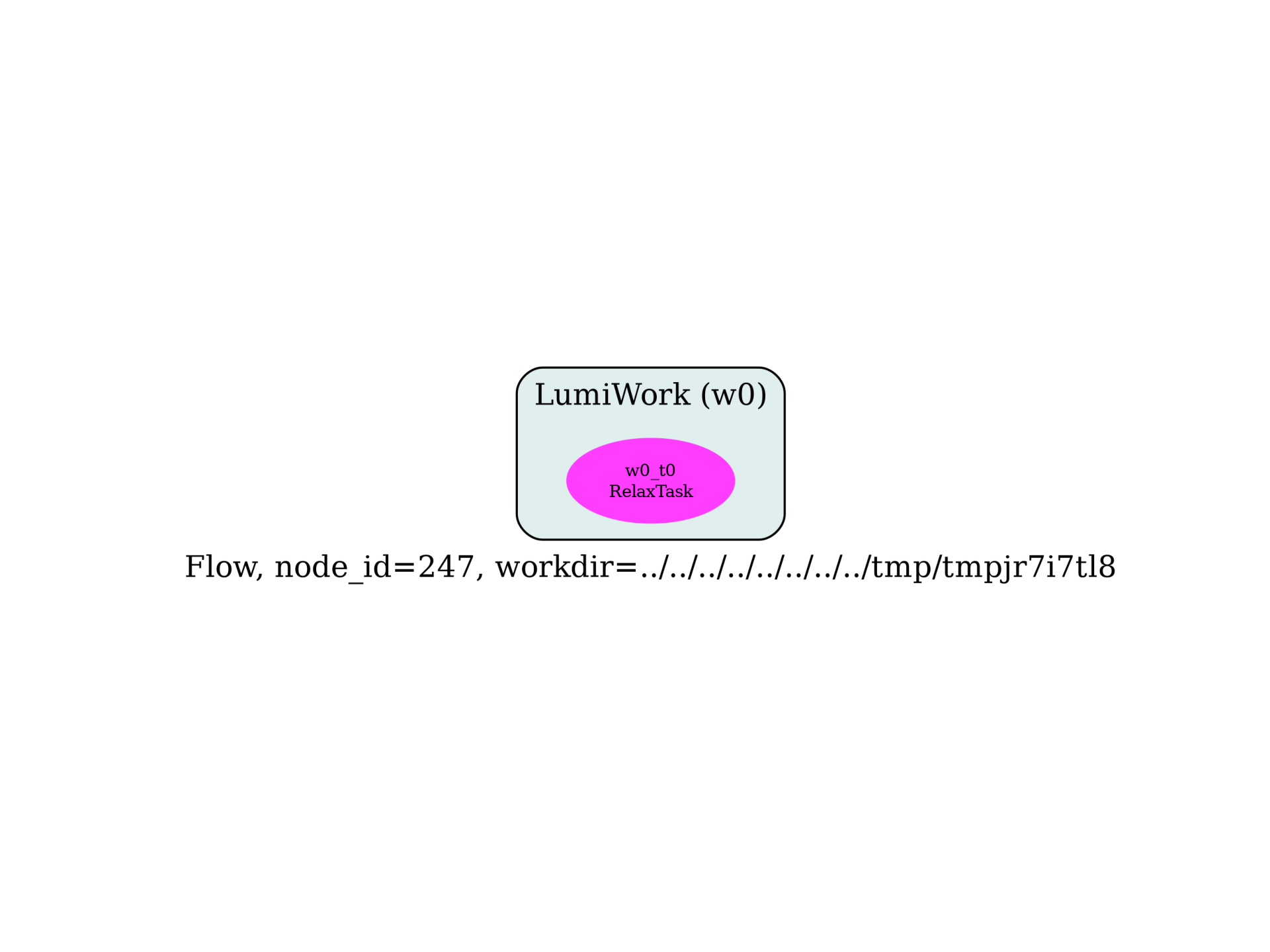Note
Go to the end to download the full example code.
Delta SCF calculation: luminescence of the NV- center in diamond
This example shows how to compute the luminescent properties of the NV- center in diamond. It uses a 64-atom supercell, where one C atom is replaced by one N atom and one vacancy is created. See Fig.3 of https://doi.org/10.1103/PhysRevB.104.045303 for the setting of the electron occupation in the ground/excited state.
Steps: 1) Relaxation in the ground state. 2) Relaxation in the excited state, starting from the relaxed ground state. Created at run-time. 3) Scf computation in the relaxed/unrelaxed ground/excited state (4 computations).
Even if we use minimal settings, the workflow takes a few minutes to run on one core. Filepaths of the six runs are stored in /w0/outdata/lumi.json
A quick post-processing is automatically done at the end of a LumiWork and stored in /w0/outdata/Delta_SCF.json, with relevant luminescent properties (ZPL energy, Stoke Shift, Delta Q,…), see abipy/lumi/delta_scf.py

import sys
import os
import abipy.abilab as abilab
import abipy.flowtk as flowtk
import abipy.data as abidata
from abipy.core.structure import Structure
from abipy.flowtk.lumi_works import LumiWork
def scf_inp(structure):
pseudos = abidata.pseudos("N.psp8", "C.psp8")
gs_scf_inp = abilab.AbinitInput(structure=structure, pseudos=pseudos)
gs_scf_inp.set_vars(ecut=10, ### too low, just for example!
chksymbreak=0,
diemac=5,
prtwf=0,
nstep=300,
toldfe=1e-10,
chkprim=0,
cellcharge=-1 ### Negatively charged NV center
)
### Setting of the occupations, for spin up-dn in the ground/excited state
### Only valid for NV center in this particular cell.
n_val = gs_scf_inp.num_valence_electrons
n_cond = round(10)
spin_up_gs = f"\n{int((n_val - 3) / 2)}*1 1 1 1 {n_cond}*0"
spin_up_ex = f"\n{int((n_val - 3) / 2)}*1 1 1 1 {n_cond}*0"
spin_dn_gs = f"\n{int((n_val - 3) / 2)}*1 1 0 0 {n_cond}*0"
spin_dn_ex = f"\n{int((n_val - 3) / 2)}*1 0 0.5 0.5 {n_cond}*0"
nsppol = 2
#Dealing with supercell, Gamma only calculation
shiftk = [0, 0, 0]
ngkpt = [1, 1, 1]
# Build SCF input for the ground state configuration.
gs_scf_inp.set_kmesh_nband_and_occ(ngkpt, shiftk, nsppol, [spin_up_gs, spin_dn_gs])
# Build SCF input for the excited configuration.
exc_scf_inp = gs_scf_inp.deepcopy()
exc_scf_inp.set_kmesh_nband_and_occ(ngkpt, shiftk, nsppol, [spin_up_ex, spin_dn_ex])
return gs_scf_inp,exc_scf_inp
def relax_kwargs():
# Dictionary with input variables to be added for performing structural relaxations.
relax_kwargs = dict(
ecutsm=0.5,
toldff=1e-5, # TOO HIGH, just for testing purposes.
tolmxf=1e-4, # TOO HIGH, just for testing purposes.
ionmov=2,
chkdilatmx=0,
)
# Relaxation settings could be different between excited and ground state...
relax_kwargs_gs=relax_kwargs.copy()
relax_kwargs_gs['optcell']=0 # in the ground state, no relaxation of the cell
# Could be different!
relax_kwargs_ex=relax_kwargs.copy()
relax_kwargs_ex['optcell']=0 # in the excited state, no relaxation of the cell
return relax_kwargs_gs, relax_kwargs_ex
def build_flow(options):
# Working directory (default is the name of the script with '.py' removed and "run_" replaced by "flow_")
if not options.workdir:
options.workdir = os.path.basename(sys.argv[0]).replace(".py", "").replace("run_", "flow_")
flow = flowtk.Flow(options.workdir, manager=options.manager)
# Construct the structure
stru=Structure.from_file(abidata.cif_file("NV_center_64_at_sc.cif"))
####### Delta SCF part of the flow #######
gs_scf_inp,exc_scf_inp = scf_inp(stru)
relax_kwargs_gs, relax_kwargs_ex = relax_kwargs()
lumi_work=LumiWork.from_scf_inputs(gs_scf_inp, exc_scf_inp, relax_kwargs_gs, relax_kwargs_ex,four_points=True)
flow.register_work(lumi_work)
return flow
# This block generates the thumbnails in the AbiPy gallery.
# You can safely REMOVE this part if you are using this script for production runs.
if os.getenv("READTHEDOCS", False):
__name__ = None
import tempfile
options = flowtk.build_flow_main_parser().parse_args(["-w", tempfile.mkdtemp()])
build_flow(options).graphviz_imshow()
@flowtk.flow_main
def main(options):
"""
This is our main function that will be invoked by the script.
flow_main is a decorator implementing the command line interface.
Command line args are stored in `options`.
"""
return build_flow(options)
if __name__ == '__main__':
sys.exit(main())
Total running time of the script: (0 minutes 1.777 seconds)